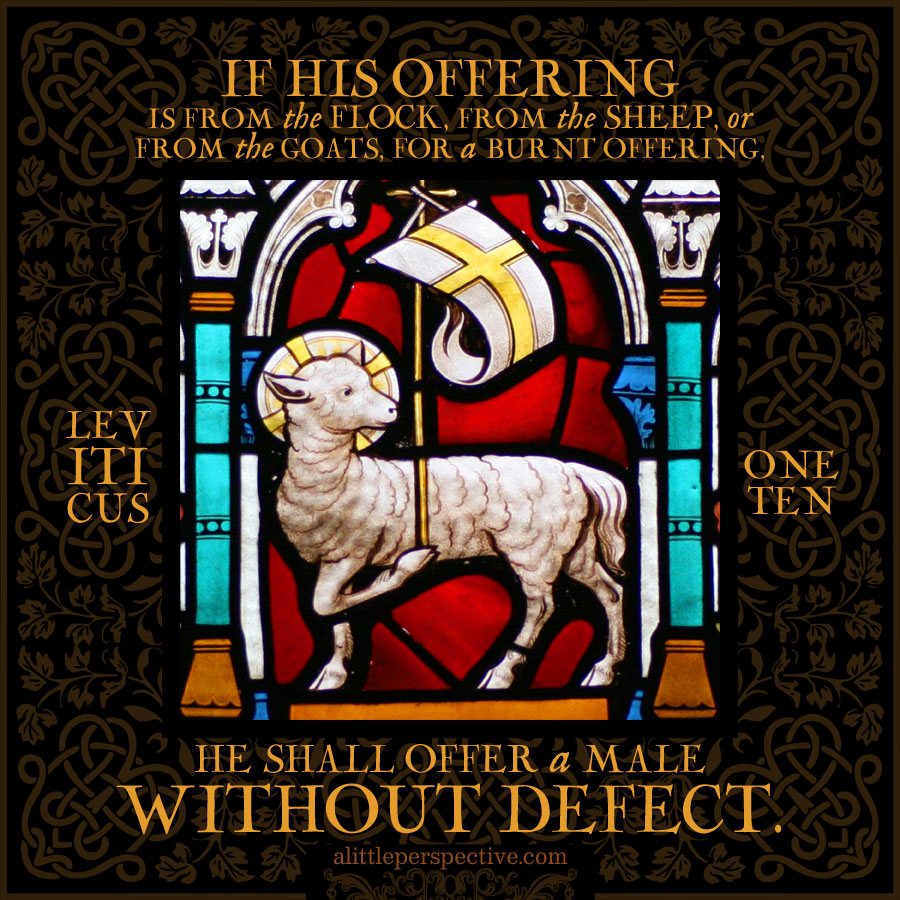Read Leviticus 1 and 2 at Bible Gateway.
Let us not be afraid of Leviticus; God’s paragraph divisions are going to help us understand it, and we are going to mine for gold for the few weeks while we are in this book!
The Hebrew paragraph divisions for today’s chapters are:
Lev 1:1-9 {s} The law of the whole burnt offering (olah) of the herd
Lev 1:10-13 {p} The law of the whole burnt offering (olah) of the flock
Lev 1:14-17 {s} The law of the whole burnt offering (olah) of the birds
Lev 2:1-3 {s} The law of the grain offering (minchah) of flour
Lev 2:4 {s} The law of the grain offering (minchah) of unleavened cakes
Lev 2:5-6 {s} The law of the grain offering (minchah) of unleavened bread
Lev 2:7-13 {s} The law of the grain offering (minchah) of unleavened porridge
Lev 2:14-16 {p} The law of the grain offering (minchah) of firstfruits
The strong themes are:
Lev 1:1-13 {s+ p} The law of the voluntary burnt offering (olah) of the herd or flock
Lev 1:14-2:16 {sx5+p} The law of the voluntary burnt offering of birds (olah) or grain (minchah)
“When any one of you brings an offering to the LORD, you shall bring your offering of the livestock — of the herd and of the flock.” Lev 1:2
“Offering” is in Hebrew, Strong’s H7133, qorban. The primary root is H7126, קָרַב, quph + resh + bet in the ancient Hebrew pictographs. The quph is a pictograph of the sun on the horizon. When the sun is on the horizon, the light seems to leave the earth and sky and gather itself to the sun. Have you ever noticed that? All the light is concentrated in the sun. So this pictograph can mean concentrate, and also, gather, as the light gathers itself back to its source. The resh is the head of a man. The bet is the house, so also the family which dwells within that house. The story the ancient pictographs is telling of qorban, is of gathering or drawing the man home.
Where is man’s home, from God’s perspective? With Him! Man was created to dwell with God, and the history we have read so far is revealing God’s plan to bring man back home to God. So the purpose of bringing a qorban, an offering, is to cause to draw near to God or gather us home with God. It is a form of worship.
“If his sacrifice is from the flock, from the sheep or from the goats, for a burnt offering, he shall bring a male without blemish.” Lev 1:10.
“Burnt offering” is in Hebrew, Strong’s H5930, olah. The primary root is H5927, עָלָה, ayin + lamed + hey in the ancient Hebrew pictographs. The ayin is the eye, so also to watch, know, or shade. The lamed is the shepherd’s staff, so also to teach, yoke, toward, or bind. Many of the cognate words of this root have to do with working, and that is because when the ox experiences, or knows, the staff, or yoke, laid across his shoulders, he is put to work. A sister meaning has to do with being raised up, as the yoke is raised up to the shoulder in order to bear a burden or do a work. The hey is the man with his arms upraised, so also look, reveal, breath, worship. The story the ancient pictographs are telling of olah, is to know the staff in worship, i.e., the rising up of the smoke of the offering as an act of worship.
Messiah is the end, the goal of Torah, and all of Torah prophesies of Him, including Leviticus! Consider:
“If his offering is a burnt sacrifice of the herd, let him offer a male without blemish; he shall offer it of his own free will at the door of the tabernacle of meeting before the LORD. Then he shall put his hand on the head of the burnt offering, and it will be accepted on his behalf to make atonement for him.” Lev 1:3-4
That Messiah was a male without blemish:
“… you were not redeemed with corruptible things, like silver or gold, from your aimless conduct received by tradition from your fathers, but with the precious blood of Christ, as of a lamb without blemish and without spot.” 1 Pet 1:18-19
That Messiah had our sins put upon Him, transferred to Him, by the laying on of hands:
All we like sheep have gone astray; We have turned, every one, to his own way; And the LORD has laid on Him the iniquity of us all. Isa 53:6
That Messiah’s death was substitutionary:
For He made Him who knew no sin to be sin for us, that we might become the righteousness of God in Him. 2 Cor 5:21
That Messiah’s death made atonement for us:
And not only so, but we also joy in God through our Lord Jesus Christ, by whom we have now received the atonement. Rom 5:11 KJV
For further reading:
Leviticus 1, The living olah
The Old Testament Offerings – a Christian perspective (not the last word)
Substitutionary Atonement of Jesus Christ – Christian Apologetics and Research


















Leave a Reply